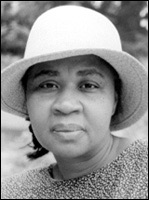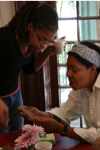Jamaica Kincaid
March 19–20, 2007
- Reading: Streaming video, MP3 audio
- Discussion: Streaming video, MP3 audio
- Introduction by Arielle Brousse: MP3
- Photos from Kincaid's visit
- An essay about Kincaid's visit by Anna Levett
- A Kelly Writers House podcast featuring 16-minute excerpt from the interview/conversation
- See the Kelly Writers House calendar entry for more about this event
- 2007 Fellows seminar notes
Bio

Using life to inspire fiction, Jamaica Kincaid often explores the complexity of mother-daughter relationships, the effects and aftereffects of colonialism, and alienation more generally. Kincaid has recently edited The Best American Travel Writing of 2005, published Among Flowers: A Walk in the Himalayas (2004) and Mr. Potter (2003) and is currently a Visiting Lecturer at Harvard University. Other works include The Autobiography of My Mother (1995), Lucy (1990) and Annie John (1985). She won the Prix Femina Etranger for her novel My Brother in 2000, a Guggenheim Fellowship in 1989, a PEN/Faulkner Award nomination and the Morton Dauwen Zabel Award of the American Academy and Institute of Arts for her first collection of short stories, At the Bottom of the River (1983). Kincaid was a New Yorker staff writer from 1976 until 1995 and has been publishing fiction and nonfiction since the mid-1970s. In addition to The New Yorker, her work has appeared in Ingenue magazine and The Village Voice. In 2004 she was elected to the American Academy of Arts and Letters.
In the New York Review of Books, Darryl Pinckney has written, "Kincaid's rhythms and the circularity of her thought patterns in language bring Gertrude Stein to mind. She is an eccentric and altogether impressive descendant."
Essay on Kincaid's visit by Anna Levett
In the days leading up to our meeting with Jamaica Kincaid, Al asked our Fellows class how we were feeling. Our response: "We're afraid."
It was hard to say just why we found Ms. Kincaid so intimidating. Perhaps it was because we knew she was six feet tall, or because her writing disarmed us with lines like, "romance is the refuge of the defeated." But we had also heard recordings of her voice-dainty in its light British accent, kind in its tone. It was her voice that created a strange divergence in our minds-between the bold, often severe voice of her work, and the warmth we felt when we heard her speak. Perhaps it was less that we were afraid, more that we had no idea what to expect. "It's possible that I say this about all the Fellows," said Al. "But I cannot wait to meet her. Who is this person?"
Arielle Brousse might have articulated our feelings best in her introduction to Jamaica at the reading on Monday night. "The more I think about it the more I understand how her writing could inspire something like fear," she said. "Jamaica Kincaid takes on epic struggles in her writing-between colonizer and colonized, between freedom and comfort, between mother and offspring, between creation and destruction, and between divergent selves, worlds and memories. To me, Jamaica Kincaid's incantatory, self-assertive work is something very near magic."
Though I think most of us knew that Jamaica would not actually turn out to be scary, we also did not expect her to be the most delightful person we had ever met.
Reports of her charm began arriving on Sunday night. In an email to the class, Jamie-Lee wrote, "I have to say that I really feel like Jamaica is up for anything - we should use this opportunity to ask her and tell her whatever we want about her work and our experience with it. This will be wonderful."
And it was. As we went around the room introducing ourselves, Jamaica posed questions to each of us. "Wait, where is Ojai?" she asked about my small California town. She encouraged those of us who were shy to speak more. One student mentioned offhandedly that she should start writing again. Jamaica answered emphatically, "Should?"-as if this was a question.
I think she loved us as much as we loved her. After spending three hours conversing, she spoke of gratitude-for appreciating her, for listening to her, for taking her seriously. "Until this moment, I don't think I've ever felt grateful for everything I have written," she said. Before she left she gave many of us hugs.
She took particular delight in the fact that we were students. At the reading and at the discussion on Tuesday morning, she spoke multiple times of her "fondness for young people." "The students this afternoon were just so kind to me; they made me feel very young again," she said. "I keep forgetting how old I am, which is not a bad thing."
That Ms. Kincaid so values youth-that she so values newness-is reflected in her work. Before meeting her, we spoke often of the deceptive simplicity, almost childlike, of her writing. Al told us that his favorite line in all of her work came from My Garden (Book), where she writes, "I shall speak of it as if no one has ever heard of it before. I shall speak of it as if it is just new."
Lisa Tauber, a student in our class, wrote, "One of the things I really love about her writing is the seemingly simple choice of metaphors and descriptions, so that it appears the world is being viewed by a child. I remember when we went to lunch, one of the first things she did was tell us some little anecdote, and then she said, 'It was as clear to me as this glass of water.' I was struck by the use of her writing style in her everyday speech. It was a nice moment where I felt I saw her artistic sensibility outside of her work."
Indeed this may be the best thing about Writers House Fellows-the chance to see from where, from who, the words on the page arise. It's nice to be reminded that even famous writers are real people.
Though she doesn't refrain from criticism (particularly when it's political), Ms. Kincaid herself likes to remember that we are all human. As our Fellows class discussion came to an end on Monday afternoon, she encouraged us to be bold, to go at the world with the same directness as a beam of light.
"That's the thing about being young," she said. "You should say all sorts of things-because you have to have something that you should be forgiven for when you're old."







